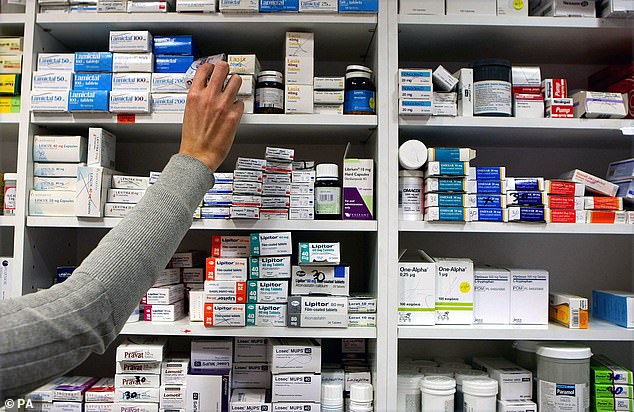Pharmacies across Britain will this month stage a “day of action” by turning off the lights in an “emergency” protest over government pay.
Thousands of chemists, providing NHS services, are expected to join the “unprecedented” action on June 20 to close their windows.
National Pharmacy Association (NPA) bosses claimed decade-long funding cuts have left pharmacy teams “suffering from increased stress and demoralisation”.
It comes just days after the Conservatives pledged to expand the role of chemists if re-elected, giving them additional powers to prescribe acne drugs, HRT drugs for the menopause, as well as contraceptive patches and injections.
Under plans designed to free up millions of GP appointments, pharmacists can now prescribe medicines for seven common ailments.
Thousands of chemists are expected to join the “unprecedented” action on June 20, which will also see windows blocked. However, National Pharmacy Association (NPA) bosses warned they were not in a position to recommend a full strike after receiving legal advice.

Under NHS plans to free up millions of GP appointments, pharmacists can hand out prescriptions for common ailments, meaning patients battling minor illnesses can avoid their GP. Under broader plans, pharmacists will also offer more blood pressure checks to at-risk patients, with a pledge to do 2.5 million a year by spring 2025.
But the Conservatives said they wanted to expand this further.
The planned protests will see pharmacists take “symbolic measures” to draw attention to the challenges facing the sector, the NPA said.
This includes “turning off the lights” for a few hours, asking staff to wear black or close windows, as well as talking to patients about the protests.
Legally, pharmacy owners are contractually obliged by the NHS to open at set times each week.
Withdrawing their work, similar to the series of strikes NHS workers have undertaken, would likely constitute a breach of their contract.
The NPA added: “We would be reluctant to support any action that undermines patient care, but we understand the level of anger that has led to calls for strike action.”
June 20 was specifically chosen because it represents the day the average pharmacy in the UK begins trading at a loss due to its obligations to the health service.
“There is normally only enough NHS funding to cover the costs of the first three weeks of any month, after which the pharmacy service becomes effectively subsidized by the company,” the NPA added.
The latest official figures show that just 11,414 community pharmacies now offer crucial NHS services such as blood pressure tests and weight management checks, the fewest since records began.
Almost 400 closed their doors in 2022/23 alone.
But the most up-to-date data from NHS England shows that the community pharmacy count, as of April 30, 2024, may be as few as 10,506.
Boots has closed branches en masse in recent months, while LloydsPharmacy has closed its doors entirely.
Pharmaceutical bodies argue the sector is also struggling due to spiraling drug prices and costs, staff shortages and a struggling GP service.
They claim pharmacies have been hit by a 30 per cent funding cut since 2015 that has led to more than 1,400 closures.
NPA chief executive Paul Rees said: “Funding for community pharmacy has been reduced over the last decade and as a result it is now a truly struggling sector.
He added: ‘It is also true that the current drug shortage crisis is partly due to funding shortfalls.
“Pharmacy teams are finding it increasingly difficult to provide excellent patient care, and pharmacy teams themselves are experiencing increasing stress and demoralization.
“With the general election in full swing, it is vital that politicians get the message – that there is now an emergency in our community pharmacy sector.”

NHS Business Services Authority data published in October shows there were just 11,414 community pharmacies remaining in England in the 2022/23 financial year.

Boots has closed numerous local branches, while LloydsPharmacy has closed its doors completely. Pictured: A Lloyds Pharmacy store in Bracknell, Berkshire.
It comes as the Conservatives this week proposed extending the Pharmacy First scheme if they are re-elected.
Under the plan, patients can visit pharmacies to treat common ailments such as sinusitis, infected insect bites and shingles.
The extension would allow pharmacies to offer birth control patches and injections, as well as treatments for other conditions, such as acne and respiratory infections.
However, the plan, which was only launched in January, is not without criticism.
Some experts have called it “risky”, warning that thousands of patients would inevitably benefit more from the “expertise” of a doctor, rather than relying solely on a pharmacist.
GPs have also said that processing updates to patient records at pharmacies will only add to their bureaucratic workload rather than saving them time.
Following the Conservatives’ announcement this week, Mr Rees urged caution over proposals to increase its NHS duties, warning that pharmacies are “barely hanging on”.
He said: ‘It’s good news that Rishi Sunak sees a bigger role for pharmacies.
‘Giving an increasing role to community pharmacies is a clear and affordable way to reduce waiting times for GPs and hospitals and provide convenient, expert care to people on their doorstep .
‘Ideas like this should be adopted by whoever forms the next government.
“But the fact is that community pharmacies are chronically underfunded and currently even have to subsidize essential NHS medicines because they are not even adequately funded for the medicines they dispense.”
‘Hundreds of pharmacies have closed and are currently forced to close at a rate of 10 per week. Those who remain open barely hold on to it.’


